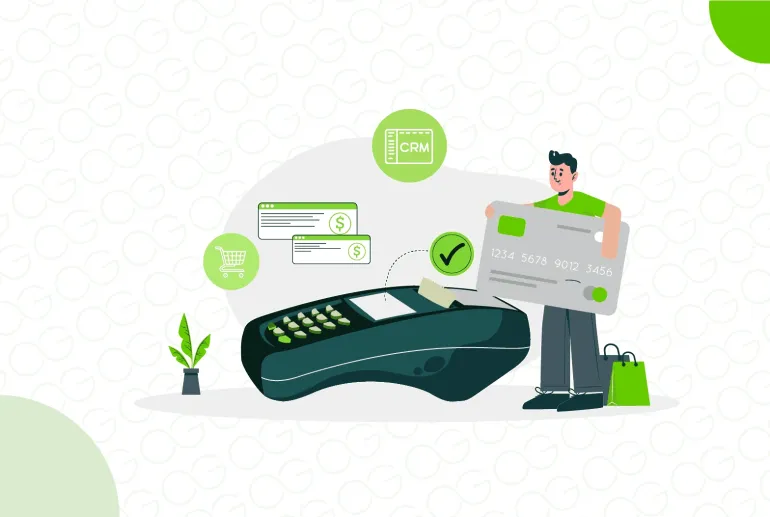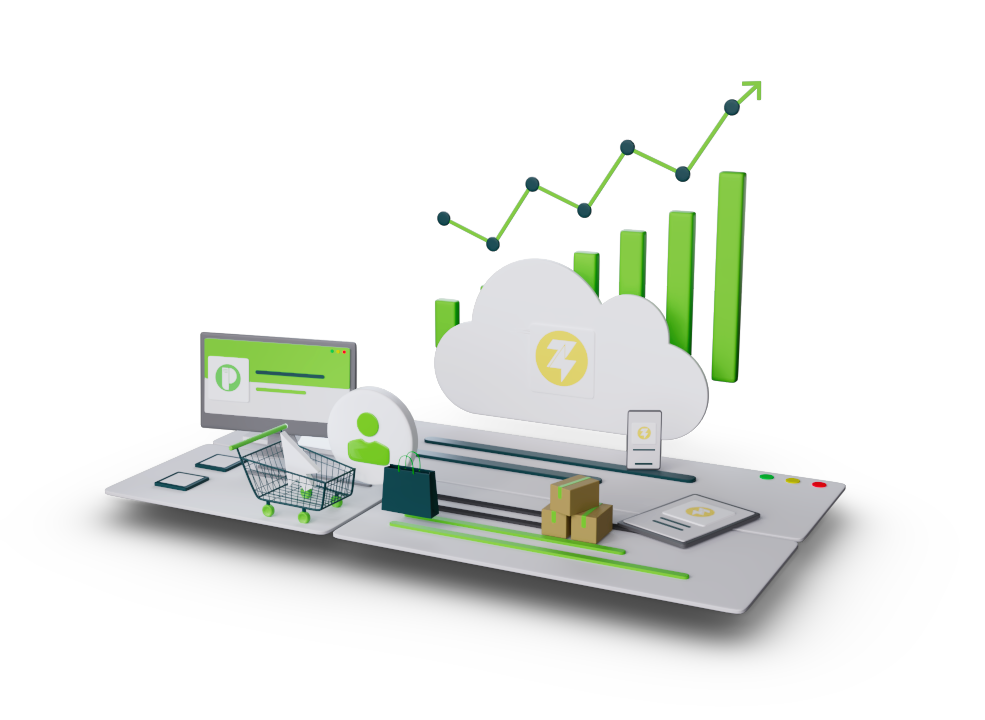What Makes a Good Retail POS System? Understanding the Essential Features for Success

In today’s fast-paced retail environment, having the right Point of Sale (POS) system is no longer just an option but a necessity for business success. A reliable POS system can streamline your daily operations, ensure customer satisfaction, and help you maintain a competitive edge. With many payment and software options available on the market, finding the right POS system for your retail business can be challenging. Each POS system offers different features, catering to various industry needs.
Whether you are running a small boutique or a large supermarket, it’s essential to choose a POS system that meets your specific business requirements. But what features should you focus on? What makes a POS system truly "good"? In this blog, we'll dive deep into the must-have features that define a strong retail POS system and how each feature contributes to business success.
Key Features of a Good Retail POS System
1. Quick Transaction Time
At the heart of any POS system is its ability to process transactions quickly. In retail, time is of the essence—particularly during busy hours when long queues can frustrate customers and lead to lost sales. If your POS billing software processes transactions slowly or frequently experiences downtime, customers may grow impatient and look elsewhere for quicker service.
A fast and reliable POS system ensures that your transactions move smoothly, reducing wait times and allowing you to serve more customers in less time. The ideal POS should also handle multiple payment types, including cash, credit, debit, and mobile wallets, ensuring that every customer can pay using their preferred method without delay.
Why It Matters:
- Increases efficiency, especially during peak hours.
- Reduces abandoned sales due to long wait times.
- Enhances customer satisfaction, leading to repeat business.

Looking for a POS system that processes transactions quickly and efficiently?
2. User-Friendly Interface
A good retail POS system should not require extensive training for your staff to use. Ease of use is one of the top priorities for any business when adopting new technology. A complex or confusing POS system will slow down your employees, increase errors, and lead to frustrated staff.
The best POS software for retail businesses comes with an intuitive, easy-to-learn interface that minimises the learning curve. This allows new employees to get up to speed quickly, ensures accurate transactions, and reduces the likelihood of errors during busy periods.
Key Advantages:
- Reduces the time and cost of employee training.
- Increases accuracy in transactions, reducing mistakes.
- Enhances productivity as employees can use the system quickly and efficiently.
3. Accurate Data Reporting
A major function of modern POS systems is data reporting. Gone are the days when the POS was only used for billing customers. Today, POS systems play a critical role in inventory management, sales tracking, and business analytics. For your retail business to run smoothly, you need real-time, accurate data about what’s happening on the floor.
Your POS software should provide real-time reports on inventory levels, sales patterns, customer preferences, and more. With this data at your fingertips, you can make informed decisions regarding stock replenishment, pricing strategies, and promotional offers. You can also identify best-selling items, seasonal trends, and underperforming products.
Benefits of Accurate Reporting:
- Helps manage inventory more effectively, avoiding stock outs or overstock situations.
- Provides valuable insights into customer buying behaviour.
- Assists in planning and implementing marketing strategies based on real-time data.
- Ensures that your business runs efficiently by offering timely and relevant data.
4. Robust Security Features
As digital transactions become the norm, the security of payment data has never been more critical. A good POS system should provide advanced security features, including PCI compliance and data encryption to protect customer payment information. In a world where fraudulent activities are on the rise, secure POS systems are essential for preventing data breaches and ensuring customer trust.
Additionally, your POS system should have role-based access control, meaning only authorised employees can access certain sensitive functions such as refunds or discounts. This minimises internal theft and fraud while ensuring smooth business operations.
Security Considerations:
- Encryption: Ensures all payment data is encrypted, preventing theft during transactions.
- PCI Compliance: Adheres to the Payment Card Industry Data Security Standard (PCI DSS) for secure card payments. This may be relevant for some geographies especially if credit card information is being captured.
- Multi-Factor Authentication (MFA): Protects against unauthorised access to your POS system.
With new payment technologies like mobile wallets and contactless payments becoming increasingly popular, your POS system should be compatible with these methods. This flexibility ensures your business stays future-ready and appeals to tech-savvy customers who prefer using their smartphones to make purchases.

5. Multi-Channel Capabilities
In today’s retail landscape, customers are no longer shopping only in brick-and-mortar stores. Many now engage in omnichannel retail, where they can browse products online, shop in-store, and receive deliveries at their doorstep. A good retail POS system should have the ability to handle both online and offline sales, integrating seamlessly with your e-commerce platform.
By unifying your sales channels, you’ll be able to offer a consistent shopping experience regardless of whether customers visit your physical store, shop through your website, or place an order through a mobile app. This also ensures that inventory is updated in real-time across all channels, preventing overselling or stockouts.
Advantages of Multi-Channel Integration:
- Creates a seamless and consistent shopping experience for customers.
- Keeps inventory updated in real-time across all channels.
- Increases sales opportunities by offering customers more ways to shop.
6. Support and Maintenance
No matter how advanced your POS system is, there will be times when you’ll require customer support—whether it’s troubleshooting a technical issue, learning how to use a new feature, or needing assistance during busy sales periods. A good retail POS provider offers 24/7 support, ensuring you can get help when you need it most.
Additionally, a reliable POS provider will offer software updates to keep your system functioning smoothly and securely. Regular updates ensure your POS system is always up-to-date with the latest security patches, features, and compliance requirements.
Why Good Support is Critical:
- Ensures minimal downtime during system issues.
- Provides peace of mind knowing that help is readily available.
- Keeps your system functioning optimally with regular updates and maintenance.

Learn how Ginesys One provides continuous support to keep your business running smoothly.
7. Inventory Management
One of the most essential features of any POS system is its ability to manage inventory effectively. Inventory management helps retail businesses keep track of stock levels, predict future demand, and automate replenishment orders. A good POS system should have inventory tracking built into it, allowing you to monitor the number of products available in real-time.
With an advanced inventory management system, you can track low-stock alerts, manage suppliers, and even forecast demand based on historical data. This not only prevents stock outs but also optimised storage space by ensuring you don’t overstock on items that aren’t selling well.
Key Inventory Management Features:
- Real-time inventory tracking across multiple locations.
- Low-stock alerts to avoid stockouts.
- Automatic reordering when inventory reaches a certain threshold.
- Supplier management to track purchases and deliveries.
8. Customer Relationship Management (CRM)
Retail is not just about selling products—it’s about building relationships. A good retail POS system should include Customer Relationship Management (CRM) capabilities. This allows businesses to store customer data such as contact details, purchase history, and preferences. With this information, you can offer personalised service, targeted promotions, and loyalty rewards.
In addition to improving customer satisfaction, CRM functionality can help retailers increase sales by analysing customer behaviour and identifying opportunities for cross-selling or upselling.
Benefits of CRM Integration:
- Allows for personalised marketing and promotions.
- Increases customer loyalty through tailored experiences.
- Helps identify your most valuable customers.

Ready to enhance your retail operations with a reliable POS system?
Wrapping Up: Choosing the Right Retail POS System
When looking for a good retail POS system, it’s important to focus on features that can improve your operations, streamline processes, and enhance customer satisfaction. From quick transaction times and user-friendly interfaces to real-time reporting, security, and multi-channel capabilities, these are essential for ensuring the smooth functioning of your retail business.
Additionally, good customer support, effective inventory management, and robust CRM features are critical to maximising the return on your POS investment.
With the right POS system, retailers can optimise their processes, improve their customer experience, and drive growth in a highly competitive marketplace.
At Ginesys One, we understand the importance of having a reliable, secure, and feature-rich POS system. Our POS software offers a user-friendly interface, real-time data synchronisation, and multi-location inventory management to meet the needs of retail businesses of all sizes.
Get in touch with us to learn more about how we can help streamline your retail operations with our advanced POS solutions.
